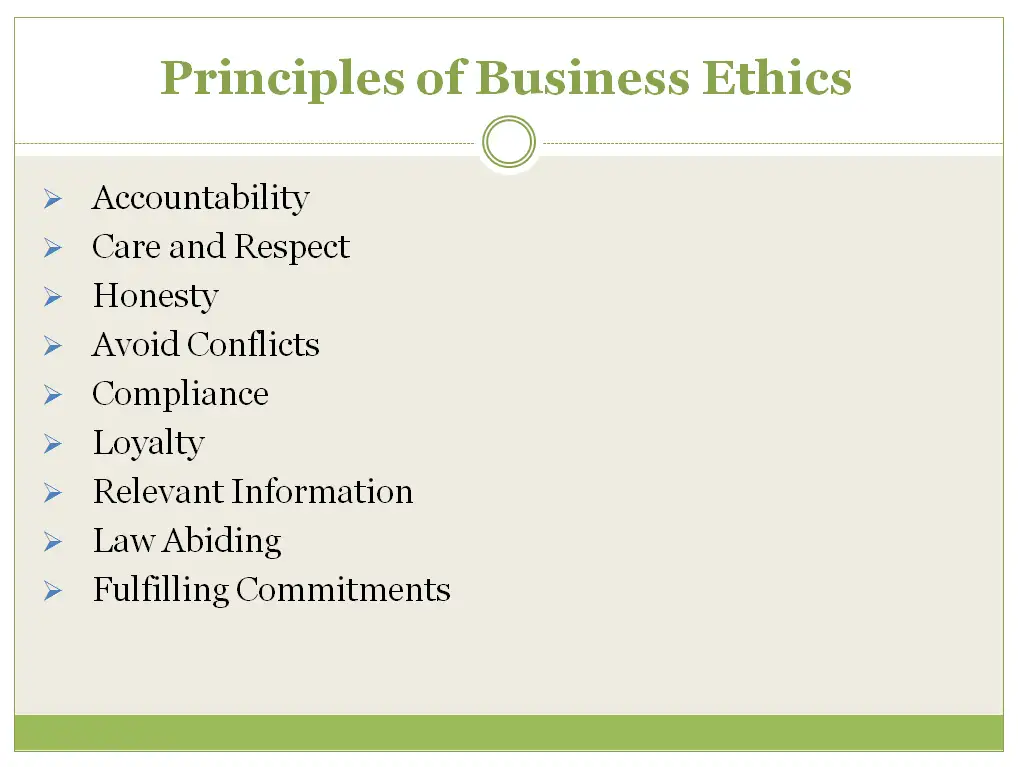Table of Contents:-
- Business ethics
- Principles of Business Ethics
Business ethics
Business ethics refers to the implementation of suitable policies and practices in the business world, particularly in addressing contentious issues. It involves the application of moral principles and values in decision making processes, ensuring that the company operates with integrity and accountability. By adhering to ethical standards, businesses can establish trust and credibility with their stakeholders, customers, employees, and investors. Ultimately, practising business ethics can lead to sustainability and long-term success for the organization.
Business Ethics is a field of study that explores the best practices for whistleblowing, corporate governance, corporate culture, and corporate social responsibility. It emphasizes the standard principles prescribed by governing bodies to ensure that businesses operate ethically and responsibly. Failure to comply with these principles can result in unnecessary legal actions, which can be detrimental to a company’s reputation and bottom line. Therefore, businesses must prioritize ethical behaviour and make it an integral part of their operations. By doing so, they can build trust with their stakeholders and contribute to a more sustainable and equitable society.
Principles of Business Ethics
The basic principles of business ethics are given as follows:

1. Accountability
Ethics is all about taking individual responsibility for one’s actions. This responsibility goes both ways, as Individuals are responsible for the unethical practices of the company if they do not come forward to become whistle-blowers. Similarly, when an employee engages in unethical business practices, the company is responsible.
2. Care and Respect
Care and respect are essential in professional interactions between co-workers. Companies must ensure that the workplace is safe and harmonious, promoting a positive and productive environment.
3. Honesty
Honesty is the best way to gain the trust of the employees and to have transparent communication with them. Transparent communication with employees fosters a culture of honesty and develops trust in the organisation.
4. Avoid Conflicts
To ensure a harmonious workplace, companies must minimize conflicts of interest. Excessive competition among employees can lead to disastrous outcomes, which can negatively affect the overall productivity and success of the organization. Companies should establish clear guidelines and policies that promote collaboration and teamwork while discouraging unhealthy competition among employees. By doing so, companies can create a positive work environment that fosters creativity, innovation, and growth of the business and employees as well.
5. Compliance
Compliance is an important aspect of any business operation. Companies must adhere to all applicable rules and regulations to ensure legal and ethical practices. Failure to comply can result in severe outcomes, including reputational damage, legal penalties, and loss of business. Therefore, companies need to prioritize compliance and establish robust compliance programs to reduce risks and maintain a positive reputation. By doing so, companies can demonstrate their commitment to ethical business practices and build trust with their stakeholders.
6. Loyalty
Loyalty is a crucial factor in any successful organization. Employees should be faithful to the company’s values and uphold its brand image. In case of any grievances, it is necessary to address them internally to maintain a positive work environment. By encouraging a culture of brand loyalty, companies can build a strong foundation for growth and success.
7. Relevant Information
Providing Relevant Information: It is imperative to provide clear and concise information. All pertinent details, regardless of their nature, whether positive or negative, must be disclosed. Concealing unreasonable terms and conditions in the fine print is unethical and should be avoided at all costs. By providing comprehensive information, a company can establish trust and credibility with its audience, which is crucial for building long-term relationships.
8. Law Abiding
Corporate laws safeguard the rights of all members of society. Any kind of discrimination is not only unethical but also illegal. Leaders must make decisions based on objective criteria rather than personal biases.
9. Fulfilling Commitments
It is considered unethical to justify non-compliance by interpreting agreements unreasonably. It is imperative to honour the commitments made and adhere to the terms of the agreement.
You May Also like:-
Problems related to public sector in Indian economy
Public sector in Indian economy
Process of Environmental Analysis
